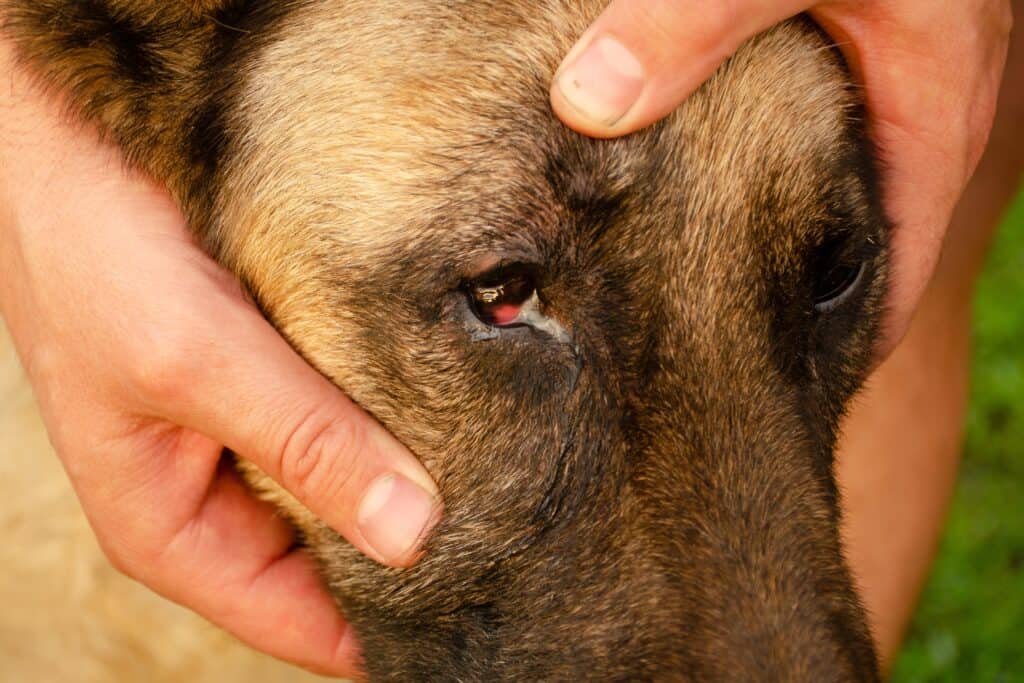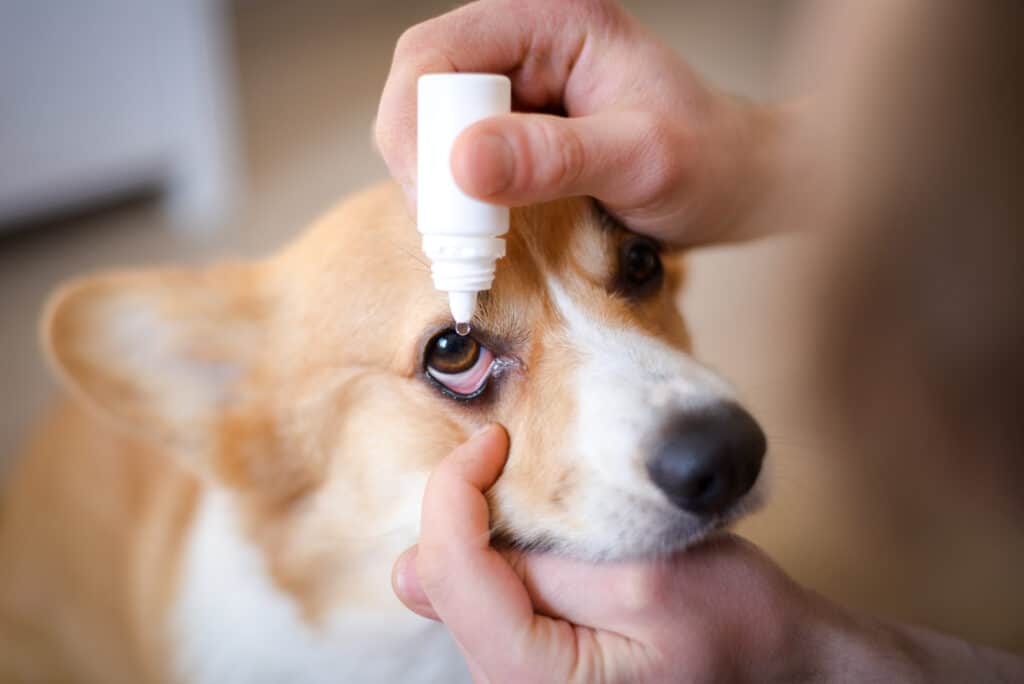Yes, dogs can get canine herpes. Canine herpes virus (CHV) is a serious disease that can affect dogs of all ages. It can cause a wide variety of side effects and health issues to arise in your dog including things like upper respiratory infection, eye disease, and inflammation in the dog’s genital area. Read on to learn more about canine herpes virus, the symptoms to be on the lookout for, and how it is treated.
How Do Dogs Get Canine Herpes Virus?
Dogs are able to contract canine herpes virus through direct contact with the mouth, nose, or vaginal fluids of a dog that is infected. A dog can also contract the virus through sexual interaction with an infected dog. Even without sexual contact, a dog can contract the virus through sniffing or licking.
Puppies can also get canine herpes virus by being in direct contact with infected fluids. This can happen during birth to a mother that is infected with the disease. The puppy can be exposed to the virus while in the mother’s womb or through her vaginal fluids. The disease can also be spread from the mother to the puppy through her nose or mouth fluids by licking or sniffing the puppy. If a litter is born, all of the puppies are at risk of being exposed to the disease.

Puppies can get the canine herpes virus from their mother.
©v-svirido/Shutterstock.com
What Are the Symptoms of Canine Herpes in Adult Dogs?
Generally, adult dogs do not have many symptoms of canine herpes virus. Any symptoms that they do have are typically mild and the disease is not considered to be serious. However, there are still a few symptoms that you can be on the lookout for to know if your dog may have the disease. They are as follows:
- Coughing
- Sneezing
- Eye inflammation
- Discharge from eyes
- Discharge from nose
- Vaginal discharge
- Inflammation in the genital area
- Stillbirth
- Abortion
If you notice any of these symptoms in your dog, you should make an appointment to see the vet so that they can confirm whether or not your dog has canine herpes. The sooner your dog is diagnosed the sooner treatment can begin.
What Are the Symptoms of Canine Herpes in Puppies?
For puppies, there are two main ways that the virus can develop which are dependent upon whether they contract the virus before or after the age of three weeks.
If a puppy contracts the virus before the age of three weeks, it develops into a more serious form of the disease. This is because the puppy’s immune system is not fully developed and isn’t strong enough to fight off the virus. Canine herpes virus can come on suddenly in puppies under this age and can be fatal in as little as 48 hours.
Here are the symptoms to be on the lookout for:
- Weakness
- Tiredness
- Diarrhea
- Less nursing
- Discharge from the eyes
- Discharge from the nose
- Eye swelling
- Abdominal bloating
- Gray or yellow soft stool
- Coughing
- Crying
- Rash
- Seizures
- Red speckles on the skin
In order for the canine herpes virus to replicate itself, it needs to be in an environment with a cooler body temperature, which is why it is so dangerous for puppies that are younger than three weeks old. After the age of three weeks, puppies will have the ability to regulate their body temperature, which gives them the ability to fight off the virus better than they can before three weeks of age.

Eye discharge is one possible sign of canine herpes virus.
©Aritel/Shutterstock.com
How Is Canine Herpes Identified or Diagnosed?
To confirm that your dog has the canine herpes virus, you’ll need to have it checked out by a veterinarian. The diagnosis will be based upon the clinical signs of the virus in dogs that are affected. This will involve the veterinarian taking blood samples that will be collected and tested for the presence of the virus. In puppies that were stillborn, a post-mortem examination can be done of the tissues to determine if the virus was the cause of death.
It is important that you take your dog to be seen by a professional as the symptoms of canine herpes virus can be easily mistaken for other similar diseases. Some of which include brucellosis and toxoplasmosis. Either of these two diseases can be infectious to humans. Similar symptoms can also be found in dogs that have bacterial infections.
Because of this, you should always seek professional help if you notice any of the symptoms mentioned above, as they can be caused by a multitude of different diseases which may require additional treatment options.
Treatment for Canine Herpes Virus
Canine herpes virus is a much more serious disease for puppies than it is for adult dogs. Unfortunately, since the virus can be deadly for puppies, there is often not much that can be done. Therefore, if you notice that a puppy is displaying the symptoms of the virus you should seek emergency veterinary care right away.
Here are a few of the treatment options for canine herpes in puppies:
- Keeping the puppy’s body temperature warm (above 95 degrees)
- Having the puppy and all others in the litter nurse from a mother dog that has the required antibodies
- Antiviral medication to treat the virus
For adult dogs that have the virus, treatment is usually not needed. You may not even realize that your adult dog has the virus, as sometimes there are no noticeable symptoms. Many times, even if your dog is experiencing symptoms, the symptoms will go away on their own. However, you should still take your dog to be seen by a vet if there are noticeable symptoms to help relieve them so that your dog can be comfortable and healthy again.
Below are some treatment options that may be used for adult dogs with the virus:
- Pain relief medication
- Eye drops
- Antibiotics
- Cough medications

Eyes drops are one element of treatment for a dog with canine herpes.
©Jus_Ol/Shutterstock.com
Is There a Way to Prevent Canine Herpes Virus?
Currently, there is a vaccine for preventing canine herpes during pregnancy available in Europe, however, it is not yet available in the United States. There are a few things you can do to help prevent the chances of your dog developing the virus.
When puppies are born, be sure to keep them warm. Their body temperature should be kept above 95 degrees in order for them to keep the virus from replicating itself if they do contract it. You will also want to isolate the puppies for three weeks after they’ve been born. You can also isolate a dog that’s pregnant for three weeks before the delivery of the puppies.
Once the puppies are born, be sure to keep their kennels clean and sanitized for the duration that they’re there. You can also have the puppies nurse from a mother that already has the antibodies for the virus the first day after the puppies are born to ensure they get the antibodies as well.
Up Next
- Can Dogs Get Alzheimer’s?
- Can Dogs Get Tetanus, What Are The Risks?
- Can You Get Worms From Dogs? What Science Says
- Can Dogs Get Pink Eye, How Do You Treat It?
The photo featured at the top of this post is © Javier Brosch/Shutterstock.com
Ready to discover the top 10 cutest dog breeds in the entire world?
How about the fastest dogs, the largest dogs and those that are -- quite frankly -- just the kindest dogs on the planet? Each day, AZ Animals sends out lists just like this to our thousands of email subscribers. And the best part? It's FREE. Join today by entering your email below.
Sources
- VCA Animal Hospitals, Available here: https://vcahospitals.com/know-your-pet/herpesvirus-in-dogs
- Fetch by Web MD, Available here: https://pets.webmd.com/dogs/canine-herpes-virus
Thank you for reading! Have some feedback for us? Contact the AZ Animals editorial team.






